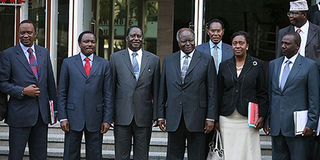New rules for Kenya presidential hopefuls

Deputy Prime Ministers Musalia Mudavadi and Uhuru Kenyatta, Vice-President Kalonzo Musyoka, Prime Minister Raila Odinga, President Kibaki, ministers George Saitoti, Charity Ngilu and William Ruto outside Harambee House in Nairobi after a past meeting in 2009. Photo/FILE
Presidential candidates will be blocked from running for parliamentary or any other position if a draft Bill to guide the next General Election is passed.
The proposed law also sets strict rules outlawing last-minute party hopping, which has been a hallmark of Kenya’s politics.
The draft Bill is being fast-tracked to ensure it is debated and passed in time to avoid delaying the 2012 elections.
It proposes that a presidential candidate nominated by a political party will not be allowed to contest a parliamentary, senator or governor’s seat.
However, it allows independent candidates who will gun for the presidency to vie for other seats.
The provision raises some questions since the Constitution does not prohibit a presidential candidate from vying for a parliamentary seat.
The draft Bill also proposes that presidential candidates should be university graduates.
In a move that will put political parties on their toes, the Bill suggests that they submit the list of their members to the electoral commission three months before nomination of their candidates.
Collecting signatures
If passed, this will effectively end the era of candidates collecting signature from anyone to prove they have supporters before the nomination.
It will now be a requirement that supporters of a person seeking nomination be in the lists deposited with the electoral commission.
The Constitution makes the requirement even more stringent as it says that the supporters must be voters. A Presidential candidate must be supported by 2,000 voters from at least 24 counties.
To be nominated to run as MP, one requires 1,000 voters from the constituency, while running for Senate requires 2,000 voters from the county.
Parties will also need to submit their nomination rules to the electoral commission at least five months before nominating candidates.
The candidates do not qualify for nomination by the electoral commission if they have not been members of the party for at least three months.
To qualify as an independent candidate, one must have not been a member of a political party three months before nomination. Their supporters can also not be members of a political party.
The Constitution bars anyone from holding more than one elective position, but does not expressly bar them from contesting for the positions. Section 24(1b) of the draft Bill says:
“A person qualifies to be nominated by a political party for presidential, parliamentary and county government elections if that person has been nominated for only one elective position under the Constitution.”
The new law will also block candidates from appointing their own agents in an election — a role that has been passed on to the parties that nominate them.
The law will also bar the nomination of election losers to the special seats stipulated in the Constitution.
This is because closed party lists to be submitted ahead of the elections will be used to allocate the nominated and special seats and will not contain those who have been nominated to run for elective seats.
The drafters of the proposed law have included the controversial rotational formula that has been suggested by women’s groups to meet the two-thirds gender requirement stipulated in the Constitution.
The Bill says that selection of the constituencies that will be required to elect a specific gender shall be random and shall cover four election cycles commencing from the 2012 elections.
“For purposes of the first election under the Constitution, the selection process shall be completed within fourteen days of the gazettement of the constituency boundaries.
“Within three months after the fourth general elections under the Constitution, the (electoral) Commission shall review the arrangement and make recommendations to Parliament,” the draft Bill says.
It gives the procedure that will be followed when constituents want to recall their MPs as allowed by the Constitution.
MPs can be recalled if they keep away from the constituency, are involved in misconduct or their integrity is questioned or if the constituents feel they have neglected their duties in Parliament.
But the recall can only be initiated in the third and fourth year of service as an MP and can only be instituted once in a single term.
For the petition to qualify for consideration, it must be accompanied by signatures of at least 10 per cent of the voters in the constituency.




